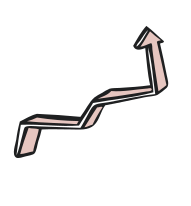







Emergency Funds; the thing you never knew you needed
When it comes to finances, we can plan and plan and plan but at the end of the day, things sometimes don’t always go to plan. You can’t see what you can’t see and there will always be unknowns around the corner. However, having an emergency fund is a must for any financially responsible adult.
Over 70% of you have an emergency fund (AMAZING), but that means nearly 30% of you don't.
Emergency funds are SUPER important. Not only do they take (a little bit of) the stress out of sticky situations, they prevent you from dipping into your investments or taking on debt.
Recently, I got into a double sticky situation. I popped a tyre AND my washing machine broke, all in the same weekend - when it rains, it pours 😒. However, instead of getting in a tizz, I thanked my past-self for creating and having an emergency fund that I could dip into for exactly this reason - an emergency.
So whether you think of it as an emergency fund, a rainy day account, a financial cushion, or an “uncertainty fund,” you need one.
How much should you have in there?
From our recent poll, over 20% of you have $10,000 or more, but 18% of you have less than $1000.
At The Curve, we typically say about one-to-three months of your salary is a good base. That can feel like a really big number, especially if you’re starting from scratch — and especially when you’ve got debt to deal with, too. So if you’re just starting out, maybe start out a little bit smaller, and add to it in consistent, small increments, until you have enough.
Where do I put my emergency money?
The best place is in a savings account with a high interest rate and easy access. Because an emergency can strike at any time, having quick access is crucial! So it shouldn’t be tied up in a long-term investment fund or in shares that go up and down all the time. The account should be separate from the bank account you use daily, so you’re not tempted to dip into it.
Saving up three months' pay, for emergencies only, is one of the earliest steps you can take to have control over your financial future. Nobody wants to be up shit’s creek without a paddle. But if you happen to find yourself there, at least you’ll now have the funds to get yourself out!


